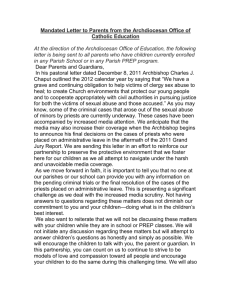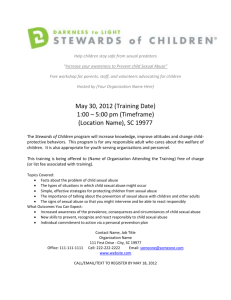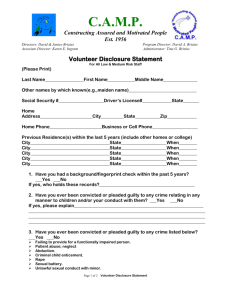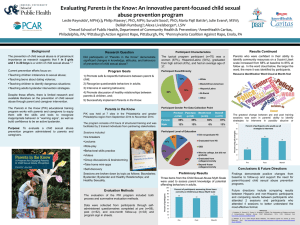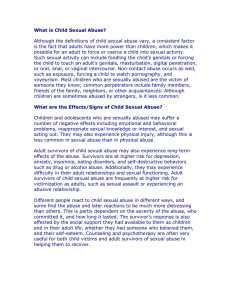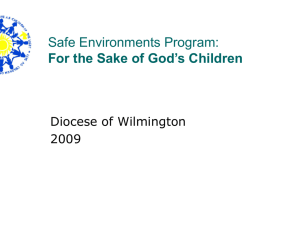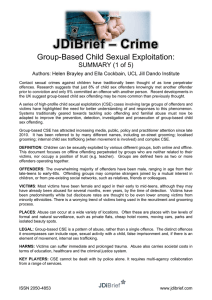Acknowledgement - Family Promise of Augusta
advertisement
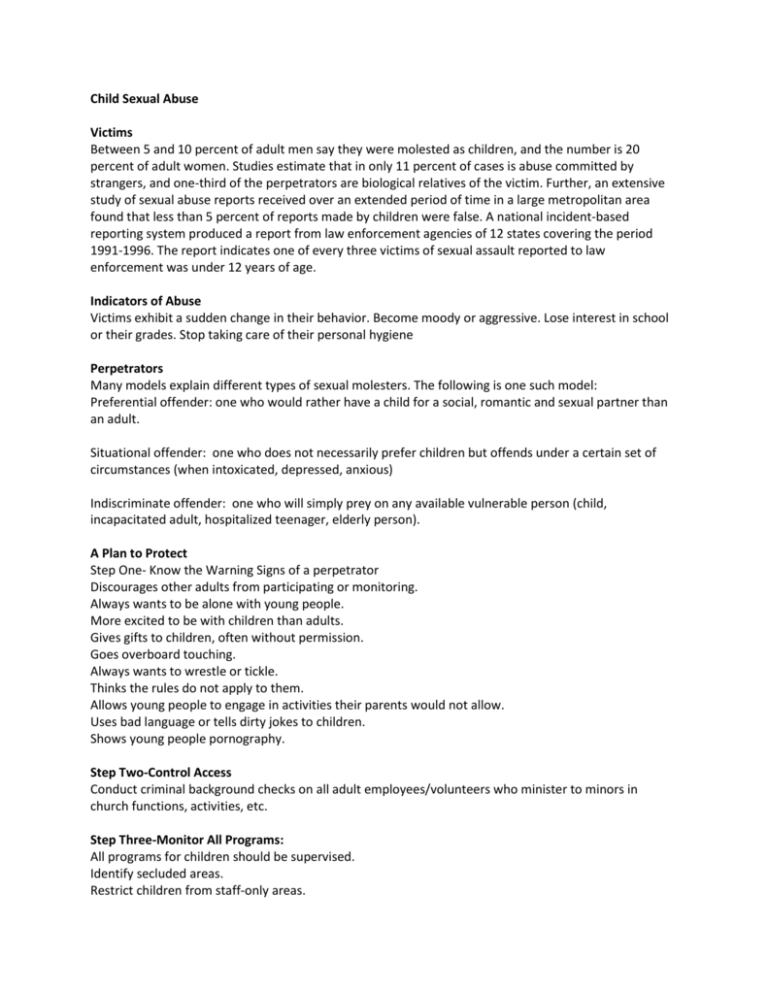
Child Sexual Abuse Victims Between 5 and 10 percent of adult men say they were molested as children, and the number is 20 percent of adult women. Studies estimate that in only 11 percent of cases is abuse committed by strangers, and one-third of the perpetrators are biological relatives of the victim. Further, an extensive study of sexual abuse reports received over an extended period of time in a large metropolitan area found that less than 5 percent of reports made by children were false. A national incident-based reporting system produced a report from law enforcement agencies of 12 states covering the period 1991-1996. The report indicates one of every three victims of sexual assault reported to law enforcement was under 12 years of age. Indicators of Abuse Victims exhibit a sudden change in their behavior. Become moody or aggressive. Lose interest in school or their grades. Stop taking care of their personal hygiene Perpetrators Many models explain different types of sexual molesters. The following is one such model: Preferential offender: one who would rather have a child for a social, romantic and sexual partner than an adult. Situational offender: one who does not necessarily prefer children but offends under a certain set of circumstances (when intoxicated, depressed, anxious) Indiscriminate offender: one who will simply prey on any available vulnerable person (child, incapacitated adult, hospitalized teenager, elderly person). A Plan to Protect Step One- Know the Warning Signs of a perpetrator Discourages other adults from participating or monitoring. Always wants to be alone with young people. More excited to be with children than adults. Gives gifts to children, often without permission. Goes overboard touching. Always wants to wrestle or tickle. Thinks the rules do not apply to them. Allows young people to engage in activities their parents would not allow. Uses bad language or tells dirty jokes to children. Shows young people pornography. Step Two-Control Access Conduct criminal background checks on all adult employees/volunteers who minister to minors in church functions, activities, etc. Step Three-Monitor All Programs: All programs for children should be supervised. Identify secluded areas. Restrict children from staff-only areas. Only meet with children where other adults can have open access. Ensure enough adults are involved in programs. Allow parents to have access to all programs. Step Four- Be Aware Know what is going on in the lives of your children (parents should talk, listen and observe). Step Five- Communicate Your Concerns Confront or tell someone when you are uncomfortable with a situation; discuss suspected abuse with a supervisor. Technology The reality is there is absolutely nothing that’s private on the internet. The internet has become the new “playground” for many perpetrators. Children and teens should be encouraged to electronically communicate only with friends or people they know. As a parent or caring adult, you must be adamant that your children never give out personal information over the internet or physically meet anyone in person that they’ve communicated with only online. Responsible adults have to become actively involved in how a child or teen uses technology. Take a look at your child or teen’s cell phone and see who they are texting and what photos have been taken or are stored on the phone. Improper use of communication devices such as the practice of “sexting” has created a whole new area of concern. In 2010 16 states enacted legislation addressing this issue and at least 21 additional states were considering bills or resolutions aimed at sexting. The result is that not only could there be a safety aspect to be considered, but a minor could be charged with a misdemeanor. Reporting Sexual Abuse Reports by a church employee/volunteer should be made to their supervisor and the director of Family Promise, or if a concern exists regarding the intended recipient of the report to respond accordingly, the reporter may instead report directly to the pastor/parochial administrator, or (if the concern rests with this individual) directly to the Director. Effective July 1, 2002, Georgia House Bill 1176 expanded the mandatory reporting requirements to include child service organizations. Specifically, sub-paragraph(b)(5) of section 19-7-5 of the Official Code of Georgia Annotated is amended as follows: “Child service organization personnel means persons employed by or volunteering at a business or organization, whether public, private, for profit, not for profit, or voluntary, that provides care, treatment, education, training, supervision, coaching, counseling, recreational programs, or shelter to children.” This new definition extends the mandatory reporting requirements to all employees and all volunteers. This includes parents, coaches, community volunteers, and board members of independent schools. Beginning with the observation by the initial reporter, a continuous written log of events, actions taken and accompanying times will be maintained by the Director of Family Promise. Reference Material Detailed information concerning policies, procedures, instructions, and applicable forms relating to all safe environment actions are available at the website of the Office for the Protection of Children and Young People (www.diosav.org/childyouthprotection). ACKNOWLEDGMENT I have read and understand the aforementioned Safe Environment Refresher Training material. Name:_________________________________________________________________ Position:________________________________________________________________ Name of church:__________________________________________________________ City:____________________________________________________________________ Signature:________________________________________________________________ Date:____________________________________________________________________


